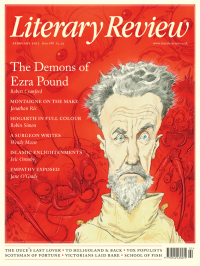Alison Flood
Hitting the Jackpot
Shirley Jackson: A Rather Haunted Life
By Ruth Franklin
Liveright 607pp £25
When Shirley Jackson’s short story ‘The Lottery’ was published in the New Yorker in June 1948, some of its readers, incredibly, believed it to be fact. Set in a village of three hundred people, it tells, in Jackson’s simple, economical style, of a ritual sacrifice in which one villager is chosen by lot to be stoned to death: ‘“It isn’t fair, it isn’t right,” Mrs Hutchinson screamed, and then they were upon her.’
Published three years after the end of the Second World War, just before McCarthyism gripped America and the witch-hunt for communists got under way, ‘The Lottery’ found a febrile readership. Jackson and the New Yorker received hundreds of letters about the tale, many of them antagonistic. Ruth Franklin’s new biography of the author, Shirley Jackson: A Rather Haunted Life, reports Jackson’s claim that ‘only 13 were kind’. ‘Readers wanted’, Franklin writes, ‘to know where such lotteries were held, and whether they could go and watch; they threatened to cancel their subscriptions; they declared the story a piece of trash.’
‘The Lottery’ wasn’t the first short story Jackson published, but, notorious on publication and much anthologised, it is by far her best known. Its reach means that, today, its piercingly perceptive, brilliant author is largely remembered, if at all, as a horror writer. Examining Jackson’s life through her diaries, through

Sign Up to our newsletter
Receive free articles, highlights from the archive, news, details of prizes, and much more.@Lit_Review
Follow Literary Review on Twitter
Twitter Feed
It wasn’t until 1825 that Pepys’s diary became available for the first time. How it was eventually decrypted and published is a story of subterfuge and duplicity.
Kate Loveman tells the tale.
Kate Loveman - Publishing Pepys
Kate Loveman: Publishing Pepys
literaryreview.co.uk
Arthur Christopher Benson was a pillar of the Edwardian establishment. He was supremely well connected. As his newly published diaries reveal, he was also riotously indiscreet.
Piers Brendon compares Benson’s journals to others from the 20th century.
Piers Brendon - Land of Dopes & Tories
Piers Brendon: Land of Dopes & Tories - The Benson Diaries: Selections from the Diary of Arthur Christopher Benson by Eamon Duffy & Ronald Hyam (edd)
literaryreview.co.uk
Of the siblings Gwen and Augustus John, it is Augustus who has commanded most attention from collectors and connoisseurs.
Was he really the finer artist, asks Tanya Harrod, or is it time Gwen emerged from her brother’s shadow?
Tanya Harrod - Cut from the Same Canvas
Tanya Harrod: Cut from the Same Canvas - Artists, Siblings, Visionaries: The Lives and Loves of Gwen and Augustus John by Judith Mackrell
literaryreview.co.uk